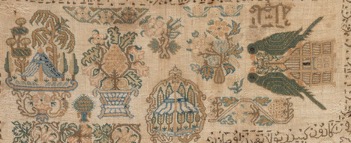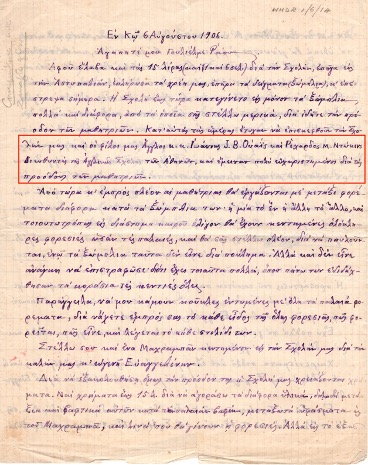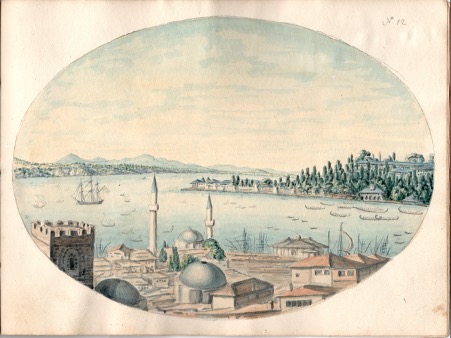In May 2022, an opportunity arose to showcase the wealth of unpublished archival material held in the Faculty of Classics Archives, which offer rich potential to historians of Ottoman and modern Greece, via the auspices of the GEA project. Greece between Europe and Asia (GEA) is a Cambridge-Stockholm collaborative Research Grant (2020-2023) under the aegis of the Faculty of Classics (University of Cambridge) and the Department of Archaeology and Classical Studies (University of Stockholm). Led by co-Principal Investigators Elizabeth Key Fowden, Tim Whitmarsh and Arja Karivieri, the project focuses on the Greater Aegean from prehistory to the present day, exploring how the region has been defined and viewed both by its wide spectrum of inhabitants and by outsiders. Four workshops will investigate issues of taxonomy (Kavala), mobility (Stockholm), betweenness (Cambridge) and dialogue (Athens).
Co-organised by Elizabeth Key Fowden and Deniz Türker, the Kavala workshop (20-23 May 2022) was underwritten by the Centre for Islamic Studies, Faculty of Classics and the History of Art Global Humanities fund (all University of Cambridge). To highlight the complex cultural intersections of the Ottoman Mediterranean, the workshop took place at the Mohammad Ali Research Center, which is housed at the Imaret, a waqf (Islamic charitable foundation) built in 1813 by Mohammad Ali Pasha of Egypt, in the city of his birth. Designed to engage a local audience with a public lecture and exhibition on the first evening, the workshop brought together scholars, curators and conservators from British, Greek and Turkish museums and universities.
Participants debated the inherent challenges of taxonomy when discussing ancient, Byzantine, Ottoman and modern Greece, and the amorphous boundaries between ‘Hellenic’ and ‘Oriental’ material culture, in the Aegean and wider Mediterranean context. The discussion’s first tangible outcome will be evident in the shape and tenor of the forthcoming exhibition at the Fitzwilliam Museum, Mediterranean embroideries, scheduled for April-August 2023 and curated by Carol Humphrey and Deniz Türker. A star exhibit will be the Turkish Sampler, embroidered in silk on linen, possibly dating to the eighteenth century or later. Its immediate provenance, prior to purchase by the Fitzwilliam in 1956, was Alan Wace (1879-1957): prehistorian and excavator of Mycenae (1920-1957), deputy Keeper of Textiles at the Victoria and Albert Museum (1924-34), Laurence Professor of Archaeology in the Faculty of Classics (1934-1944), and an avid and knowledgeable collector of Greek and Turkish embroideries from his early twenties.
Fitzwilliam Museum, detail from Turkish sampler T.1-1956, (photo: © Deniz Türker). Deniz Türker,‘Professor Wace’s Turkish Sampler: Ottoman Women Embroiderers and Continental Collectors of Woven Archaeologies’, Textile Museum Journal, November 2022
Alan Wace’s diverse interests, in archaeology, ethnography, architecture, philology, the applied arts and material culture both ancient and modern, cause him to be a common thread across a wide variety of museum and archive collections in England, Greece and the USA. At Kavala, Rebecca Naylor, Archivist in the Faculty of Classics, introduced the plethora of archives held by the Faculty that support investigations into Ottoman and modern Greece. These include the letters of the schoolteacher and folklorist of Kos, Iakovos Zarraftis (1853-1933), briefly the champion of revitalising Dodecanese island embroidery traditions. Wace and his travelling companion Richard M. Dawkins, each focussed on augmenting their textile collections, met Zarraftis on the island of Astypálaia, home to a newly established girls’ embroidery school, in 1906.
© Faculty of Classics Archives, University of Cambridge. Letter from Iakovos Zarraftis to William H. D. Rouse, 6 August 1906, mentioning the visit of Wace and Dawkins. Ink on school exercise paper, GBR/3437/WHDR 1/6/14
Alan Wace is emblematic of the blended rôles of scholar-collector-curators, who set the descriptive terms which have categorized museum holdings ever since. The Kavala workshop was a fruitful preliminary stage in the process of reevaluating twentieth century categorizations, and former academic certainties, around geographical, ethnographic and cultural definitions –particularly in the interpretation of material culture – in the eastern Mediterranean basin.
© Faculty of Classics Archives, University of Cambridge. George Koehler (1758-1800), ‘Büyükdere on the Bosporus’,Large sketch book H. 7" x W. 9½”, water colour on paper, GBR/3437/KHLR 1/2



